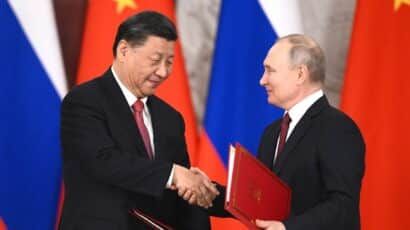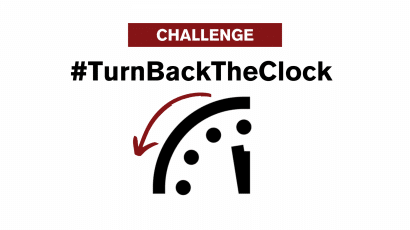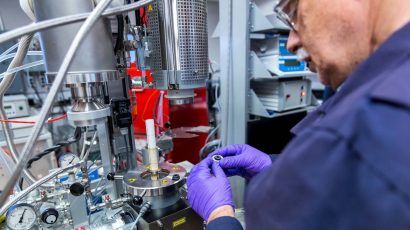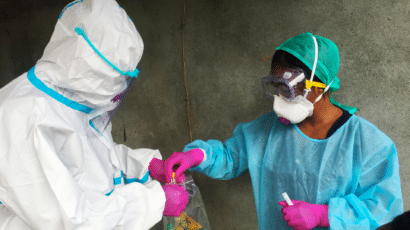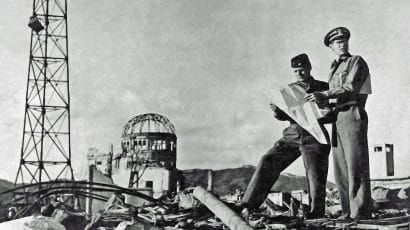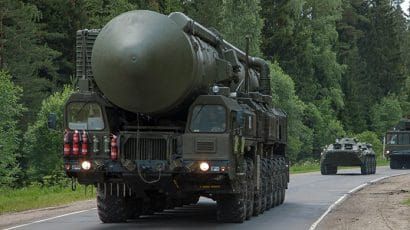Search results for Koch
Good, bad, ugly, relieved: Reactions to the Supreme Court decision on the EPA and climate change
The future of US efforts to fight climate change was clouded significantly Thursday when the US Supreme Court ruled to limit the EPA’s powers to broadly regulate power plant greenhouse gas emissions. The country’s political divisions were reflected in reactions to the 6-3 decision, Republicans praising it, sometimes in fulsome terms, and many quarters on the political left decrying it.
Doomsday Clock conversations
Doomsday Clock conversations For over 75 years, the Doomsday Clock has shaped culture, politics, and global policy. Today, it continues to be a popular topic on social media. Below you will find a collection of some of the most recent conversations about the Clock. Tag us in your posts to join the conversation. 人類の終末まで「残り90秒」。 世界の破滅にどれほど近づいているかを残り時間で示す「終末時計」は過去最短を維持しています。 … Continued
How to ensure Iran never resumes reprocessing
Outspoken critics of the Iran nuclear deal maintain a selective focus on the agreement’s sunset provisions, losing sight of the tremendous restrictions that will constrain Tehran’s nuclear program for many years to come.
Putin’s folly in Ukraine
How Putin has undermined Russian interests with his actions in Ukraine, and why the United States needs to help Russia find a face-saving way to withdraw its forces from Crimea.
Donor Appreciation
The Bulletin of the Atomic Scientists recognizes with gratitude the foundations and individuals listed below, who have supported us since January 1, 2010. FoundationsCarnegie Corporation of NYCivil Society InstituteCompton Foundation, Inc.David Blittersdorf Family FoundationJohn D. and Catherine T. MacArthur FoundationNew-Land FoundationNorwegian Ministry of Foreign AffairsPloughshares FundProspect Hill FoundationRockefeller Family & AssociatesSeedlings FoundationStewart R. Mott Charitable … Continued
Building promises of small modular reactors—one conference at a time
Earlier this year, small modular reactor (SMR) enthusiasts from industry, government, and business gathered in Atlanta to discuss the promise of a SMR-led revival of the nuclear industry: “This time, it will be different!”
China debería procurar la estabilidad nuclear, no la utopía del desarme
Debatir si China puede dirigir al mundo hacia el desarme nuclear, como han hecho mis colegas en esta mesa redonda, es hacer la pregunta equivocada en el momento equivocado. China no tiene por costumbre luchar contra los molinos de viento, e intentar avergonzar a Pekín para que asuma el liderazgo en el desarme es, o … Continued
How a dispute over sharing coronavirus genomes is threatening a vital tool for tracking variants
Powerful figures in the scientific establishment want coronavirus genomes shared in the public domain, meaning anyone, anywhere could use the information without so much as crediting the people who generated the data. This could be a recipe for seeing contributions from less wealthy countries, where notable COVID-19 variants are likely to be spotted, dry up. For a long time, so-called developing countries have aided viral surveillance without reaping its benefits such as access to vaccines or scientific credit. Public domain sharing will exacerbate that dynamic.
Ciencia para la paz
Anteriormente, en la Tercera Ronda, mi colega Akira Kawasaki se refirió a la dicotomía entre los principios sostenidos por Japón, que promueven el desarme, y sus políticas, que no fomentan esta causa. Mustafa Kibaroglu llevó a cabo un análisis similar para Turquía. Esta misma dinámica se manifiesta en otros lugares. Por ejemplo, el Reino Unido … Continued
Counting the dead at Hiroshima and Nagasaki
How many people really died because of the Hiroshima and Nagasaki bombings? It’s complicated. There are at least two credible answers.
Radiation exposure and the power of zero
The ongoing nuclear power plant disaster in Japan has once again pushed the topic of radiation safety into the public consciousness, while also reminding us that the public continues to doubt government and nuclear industry information on safety and the effects of radiation. Part of this wariness stems from the fact that people cannot detect radiation using their own senses, which creates a dread of the unknown. People are also very aware that the effects of radiation are cumulative and may not appear for many years, so the outcome of a disaster like Fukushima is not easy to predict.
The Trident Dispatches No. 1: An overview of the debate
Does Britain need to replace its nuclear weapons? The current system, which comprises four nuclear submarines, around 50 U.S. Trident D5 ballistic missiles, and up to 200 warheads similar to the U.S. W76 (around 100 kilotons each), is good to go until well into the 2020s. So why is British Prime Minister Tony Blair so keen for a decision before he departs office?
From the Bulletin archives: Selected readings on Chernobyl
The crisis at Japan's Fukushima Daiichi nuclear power plant following the 9.0 earthquake and tsunami on March 11, has brought the past tragedies at Chernobyl and Three Mile Island into the spotlight again. To offer a more thorough understanding of Chernobyl, the Bulletin has compiled this reading list from its archives. Dating from 1945 to 1998 and 1998 to present, the Bulletin's archives are a valuable resource for those interested in additional materials.
La participación de Estados Unidos es fundamental para el control de armas en Asia Meridional
Debido a la nuclearización de Asia Meridional, el conflicto indio-pakistaní dejó de ser una cuestión regional para convertirse en un problema global. Un intercambio de 100 armas nucleares entre las dos naciones podría matar a 20 millones de personas en el plazo de una semana, así como reducir la temperatura global en 1,3 grados centígrados, … Continued
La buena gobernanza es clave para el problema climático
Para sobrevivir los seres humanos deben consumir recursos naturales. Por consiguiente, producen contaminadores de carbono. Cuanto mayor sea la población humana, mayores serán las emisiones de carbono y más graves las consecuencias para el medio ambiente. Esta es una perspectiva esencialmente pesimista sobre la relación entre la población y las emisiones de carbono, y parece … Continued
¿Qué es mejor para el clima: la buena gobernanza o el sexo verde?
La tasa de crecimiento demográfico y el tamaño de la población: las personas tienden, a veces, a confundir estos conceptos al hablar sobre el rol de la población en el cambio climático. Por supuesto se trata de dos conceptos relacionados, pero que se diferencian considerablemente cuando se trata de considerar opciones de políticas para mitigar … Continued
China y el desarme: tres preguntas para seguir adelante
En medio de la posible transformación actual de un orden global centrado en EE. UU. a uno multilateral, tal como lo describió mi buen amigo Gregory Kulacki en esta mesa redonda, el desarme nuclear está ocupando nuevamente un lugar muy importante entre los asuntos que son objeto de debate entre estrategas, científicos y adoptadores de … Continued
Nuclear Notebook: How many nuclear weapons does Russia have in 2022?
This Nuclear Notebook examines Russia’s nuclear arsenal, which includes a stockpile of approximately 4,477 warheads. Of these, about 1,588 strategic warheads are deployed on ballistic missiles and at heavy bomber bases, while an approximate additional 977 strategic warheads, along with 1,912 nonstrategic warheads, are held in reserve. The Russian arsenal is continuing a comprehensive modernization program intended to replace most Soviet-era weapons by the mid- to late 2020s.
As of February 23rd, 2022, some of the Russian delivery vehicles that are currently deployed near Ukraine are considered to be dual-capable, meaning that they can be used to launch either conventional or nuclear weapons; however, at the time of publication, we have not seen any indication that Russia has deployed nuclear weapons or nuclear custodial units along with those delivery vehicles.
Watts Bar Unit 2, last old reactor of the 20th century: a cautionary tale
The TVA used to be at the forefront of new technology. Not anymore.
